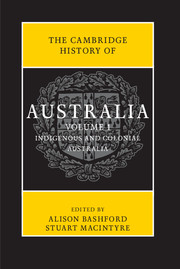Book contents
- Frontmatter
- Contents
- Abbreviations
- List of maps
- List of figures
- List of tables
- Notes on contributors
- Map
- Preface
- Introduction
- PART I
- 1 The past 50,000 years: an archaeological view
- 2 Newcomers, c. 1600–1800
- 3 Convict transportation in global context, c. 1700–88
- 4 The early colonial presence, 1788–1822
- 5 Expansion, 1820–50
- 6 The advent of self-government, 1840s–90
- 7 The gold rushes of the 1850s
- 8 Colonial states and civil society, 1860–90
- 9 Rethinking the 1890s
- 10 Making the federal Commonwealth, 1890–1901
- PART II
- Further reading
- Chronology
- Index
- Frontmatter
- Contents
- Abbreviations
- List of maps
- List of figures
- List of tables
- Notes on contributors
- Map
- Preface
- Introduction
- PART I
- PART II
- Further reading
- Chronology
- Index
6 - The advent of self-government, 1840s–90
from PART I
Published online by Cambridge University Press: 05 November 2013
- Frontmatter
- Contents
- Abbreviations
- List of maps
- List of figures
- List of tables
- Notes on contributors
- Map
- Preface
- Introduction
- PART I
- 1 The past 50,000 years: an archaeological view
- 2 Newcomers, c. 1600–1800
- 3 Convict transportation in global context, c. 1700–88
- 4 The early colonial presence, 1788–1822
- 5 Expansion, 1820–50
- 6 The advent of self-government, 1840s–90
- 7 The gold rushes of the 1850s
- 8 Colonial states and civil society, 1860–90
- 9 Rethinking the 1890s
- 10 Making the federal Commonwealth, 1890–1901
- PART II
- Further reading
- Chronology
- Index
- Frontmatter
- Contents
- Abbreviations
- List of maps
- List of figures
- List of tables
- Notes on contributors
- Map
- Preface
- Introduction
- PART I
- PART II
- Further reading
- Chronology
- Index
Summary
Prior to British colonisation, Australia was populated by self-governing Aboriginal societies. Linked through kinship and trade, these societies, though sometimes hostile to one another, neither seized each other's land nor sought to exploit the labour of other groups. Their system of government was through transmission of ancestral law, kinship networks and power differences based largely on age and gender, and ceremonies and ritual. If Aboriginal people were self-governing, the British who encountered them thought they lacked government altogether, an idea that was foundational to Britain's proclamation of their lands as settled colonies. Whereas British colonisers in other parts of the world usually had to recognise and negotiate with indigenous systems of government, in the Australian colonies they rarely did so.
This chapter examines the granting of a different system of self-government to most of the Australian colonies in the 1850s and to Western Australia in 1890. It is also concerned with its shadow-side: Aboriginal dispossession, loss of self-government and enforced dependence on colonial charity. Self-government was a complex matter for colonies such as New South Wales and Van Diemen's Land, given their origins as convict settlements. Over time, as the free proportion of the population increased and under pressure from the colonies, Britain had granted elements of what was known as ‘representative government’: a local parliament, called a legislative council, whose task was to represent ‘the people’ and make laws on a specified range of matters. While the early legislative councils were nominated and advisory, they grew in size, authority and representativeness as the proportion of elected members increased. Representation by itself, however, was not enough; what mattered was whether the governor (representing the crown) or parliament (representing the people) had control.
In the mid-nineteenth century, imperial and settler interests combined to produce a particular system known as ‘responsible government’.
- Type
- Chapter
- Information
- The Cambridge History of Australia , pp. 149 - 169Publisher: Cambridge University PressPrint publication year: 2013
- 7
- Cited by



